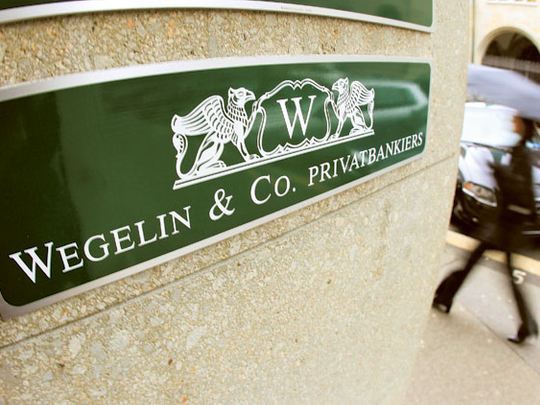
Washington: The US government has raised the stakes in its crackdown on Swiss banks through a hard-charging prosecution that has forced the closing of a 272-year-old Swiss firm for offering tax evasion services to wealthy Americans.
Tax lawyers and former prosecutors said on Friday the closing of Wegelin & Co., Switzerland’s oldest private bank, served as a stark warning for some Swiss banks under investigation, especially smaller firms such as Wegelin.
Wegelin, founded in 1741, said on Thursday it would shut its doors permanently after pleading guilty to an indictment charging it with helping Americans dodge taxes through secret accounts.
It was the first time the United States forced a foreign bank to close because of its sale of tax evasion services.
“The Justice Department wanted a scalp to send a message to all the other banks, in particular the small cantonal and private banks,” said Christopher Rizek, a tax lawyer at Caplin & Drysdale in Washington, D.C., and a senior former Treasury Department tax official.
Criminal scrutiny
Around a dozen banks are under criminal scrutiny by the Justice Department, including Credit Suisse AG, which disclosed last July it had received a target letter saying it was under a grand jury investigation.
Zurich-based Julius Baer and some cantonal, or regional, banks are also under scrutiny, US sources familiar with the probes previously told Reuters. So are UK-based HSBC Holdings Plc and three Israeli banks, Hapoalim, Mizrahi-Tefahot Bank Ltd. and Bank Leumi, US sources briefed on the matter said previously.
The widening probe grew out of an investigation of Swiss bank UBS AG, which in 2009 entered into a deferred prosecution agreement and paid a $780 million (Dh2.86 billion) fine after admitting to wrongdoing in selling tax evasion services to wealthy Americans.
Unlike UBS or Credit Suisse, both major global players widely regarded as “too big to fail,” Wegelin and the cantonal banks are smaller institutions unlikely to pose any systemic risk to the global financial system if indicted or put out of business.
As such, the old model in which UBS averted indictment and survived does not appear to be a road map going forward for smaller banks, tax lawyers said.
Jeffrey Neiman, a former federal prosecutor involved in criminal proceedings against UBS, said that “the cantonal banks that have similar exposure now have a blueprint to look at in order to see how to resolve their liability.”
The prosecution and closing of Wegelin, however, did not sacrifice a significant number of jobs. Although Wegelin had about a dozen branches, all in Switzerland, at the time of its indictment, it moved quickly to wind down its business, partly through a sale of its non-US assets to regional Swiss bank Raiffeisen Gruppe.
In contrast, after Arthur Andersen was found guilty for its role in the failed energy company Enron Corp., the accounting firm went out of business in 2002. A 2005 Supreme Court ruling later overturned the conviction, but it was too late to save the firm.
Bank client data
Wegelin’s plea offers other hints of things to come. The Swiss government has been at odds with the United States over secrecy laws that govern bank client data and the plea leaves open the question of how or whether the bank will disclose client data in coming months. Going forward, the role of the Swiss in resolving the logjam could be magnified.
Neiman said the plea, which ended the case against Wegelin, but required it to preserve client data, suggested the US government had decided to take the issue of client data “head-on with the Swiss government” and not with the Swiss banks.
“Clearly there is another process at work here and it’s one in which there is now not going to be a compelled disclosure in connection with a plea,” said Scott Michel, a tax lawyer at Caplin & Drysdale in Washington, D.C. with many wealthy clients of Swiss banks.
As part of its agreement, UBS was required to turn over some 4,450 client names, a long process that involved Swiss financial and legal authorities and rattled sacred Swiss secrecy laws. US authorities have long maintained that client data is their prime quarry.
But by leaving open the question of how or if Wegelin will disclose client data, the Wegelin plea magnifies the new role the Swiss government will likely have to play in resolving its logjam with the United States over secrecy laws protecting bank client data.
Handover of client details
A Swiss government source declined to comment on long-running talks between Switzerland and the Justice Department and US Internal Revenue Service (IRS) regarding a handover of American client names. The two sides are set to meet “shortly,” the source said.
US authorities already hold more weapons in their arsenal following the 2009 agreement with UBS. Since then, tens of thousands of Americans have come forward to the IRS to voluntarily disclose their hidden offshore accounts, providing a road map to the inner workings of Swiss banks, and prosecutorial leverage over them.
Last December, Switzerland agreed to comply with new US disclosure rules on offshore accounts controlled by Americans, a new enforcement regime known as FATCA, or the Foreign Account Tax Compliance Act.
“The Justice Department has a lot more leverage now than it did with UBS,” said James Mastracchio, a tax controversy lawyer at Baker Hostetler in Washington, D.C. Unlike UBS, whose case dragged out over several years, Wegelin, indicted less than a year ago, “had a very fast acceptance of responsibility.”












